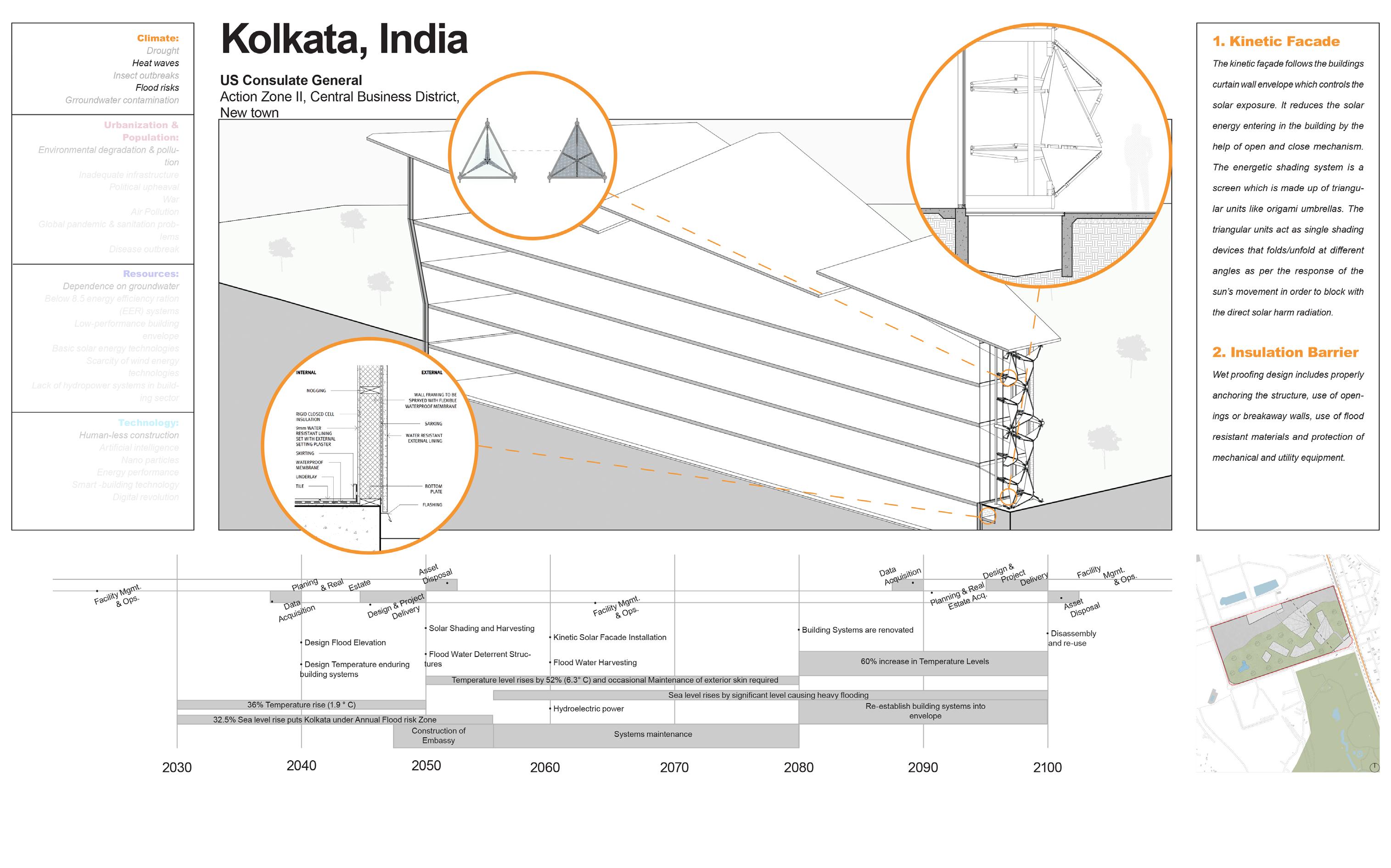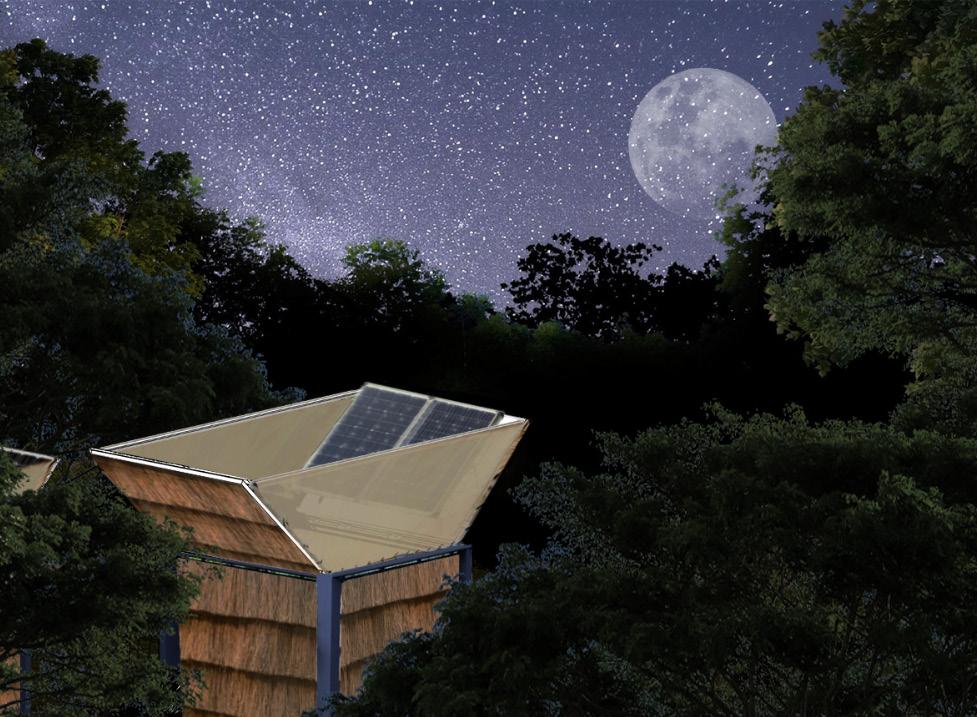
Name: Niharika Kuruvada

Contact: ckuruvad@asu.edu
Year: 2023
School: Arizona State University
Greetings, I am Niharika Kuruvada, an architecture student at ASU who is passionate about learning and exploring the realm of design and architecture. My portfolio showcases my institutional and professional works, reflecting my growth and evolving philosophy towards the interrelationship of coursework and classroom experiences. Through this portfolio, I hope to demonstrate my unique yet valuable set of skills that have been developed through a multitude of analytical and creative tasks.
2
PROFILE
HELLO
Bachelors in Architecture

2018
.
TIMELINE & INDEX
Assistant Art Director
2020
Set designing
Arizona State University
Masters in Architecture
August 2021
The Expansion Game
Research Assistantship
Runner-up for Design Excellence Award
Design Excellence Award
OBO research Project
Design Excellence Award
Junior Architect 2018-2019
Healthcare Project
Residential Project
1. Healthcare Project Multi-speciality Hospital
2. Residential Project Vacation Home
3. Set Designing Movie Sets
Hawaii Project
Graduation
May 2023

4. The Expansion Game Architecture of Renewal: Yale University Art Gallery
5. OBO Research Project
Embassy 2050: Innovation for Security Resilience, and Sustainable Operations
6. Hawaii Project
Shaping of new architectural spaces and landscapes for wellbeing on Hawaii for Kō Hana Distillers
Projects . . . .
Travel Studio
Multi-speciality
Challenges

Project Complexity


Communication & Collaboration
Balancing Budget and Design
Prioritizing certain design elements
The Multi-Speciality Hospital project in Hyderabad, India, takes a ganization, education, & humane factors in internal spaces. The hospital’s maximizes connections between internal and external environments, in 2019, this project reflects a commitment to creating a healthcare for patients

4
PROJECT 1
Multi-speciality Hospital
Managing Construction Risks Tight Project Timeline

Exploring creative solutions

Have clear deadlines & milestones



Resolutions / Takeaways
a unique approach to healthcare design by prioritizing functional orhospital’s construction emphasizes the optimization of natural light and environments, offering stunning views of the naturally preserved site. Completed healthcare environment that promotes movement, visualization, and wellbeing and staff alike.


CONCEPT DIAGRAM
This is a massing diagram that shows how outdoor spaces are arranged in a layered sequence, moving from public areas to private areas for critical care and patient well-being. The design prioritizes patient privacy and comfort to promote recovery and create a supportive environment.

MASSING DIAGRAM

8
BLOCK C Kitchen & Cafeteria(General, Staff, Doctors) Exterior Landscape Spaces for Expo/Exhibition
BLOCK B Auditorium, Banquet Hall, Doctor’s Offices & Lab
AXONOMETRIC VIEW
BLOCK A Oncology
 Doctor’s Accomodation Institution Block
NRI Hostel & Mens Hostel Dharmashala Block
Doctor’s Accomodation Institution Block
NRI Hostel & Mens Hostel Dharmashala Block
The ground floor plan for an oncology block includes examination rooms, infusion bays, and waiting areas. Safety and comfort are prioritized for patients and staff, with attention to hygiene, equipment placement, and specialized features like air filtration and lighting. The plan creates a supportive environment for oncology patients.

10
GROUND FLOOR PLAN
A typical hospital floor plan includes patient rooms, staff offices, and specialized areas like surgical suites and imaging centers. It’s designed to support high-quality healthcare services with accessible entrances, specialized equipment, and communication systems for smooth flow & a safe and supportive hospital environment.

TYPICAL FLOOR PLAN


12 PHYSICAL PROTOTYPE MODEL
A physical prototype model with replaceable blocks is a 3D scale model of a building features modular components which can be rearranged to experiment with different orientations and layouts. The model was constructed using materials like balsa wood, to showcase the building’s exterior facade. The replaceable blocks allowed us to easily modify the model and explore different design possibilities, helping to better understand the scale, proportion, and spatial relationships of the proposed structure.


Vacation
Challenges
Creative Differences

Resource Allocation
Seek compromise
Identify areas for additional resources


This vacation home is located in Hyderabad, India and was eas: the lower level and the upper level. The lower level is per level is for accommodation and includes a bedroom, a living vate areas are separate from the common ones, and each of the fosters an intuitive understanding of the space, with the sleeping

14
PROJECT 2
Resolutions / Takeaways





completed in 2019. The floor plan is divided into two aran active space with a pool, gym, spa, and Jacuzzi. The upliving room with a courtyard, a pantry, and a washroom. The prithe two wings has its own purpose. The simplicity of this layout sleeping area and common area flowing seamlessly into one another.

Home Maintain attention to detail
clear project boundaries Quality Control Project Scope Creep
Vacation
Have
The Vacation pool house was designed to create a wide variety of experiences within a relatively small set of indoor and outdoor spaces, all within easy reach of each other. Moving through the space reveals a range of dedicated areas, including a pool area for adults and kids, trellised sections that frame the sky, a spa, therapy rooms, gym, Jacuzzi, and an open deck area for yoga. The layout also includes a bedroom, pantry, living room, and closet area. In addition, enclosed areas are provided for storage, a changing room, and a bathroom. With its unique arrangement of spaces, this pool house provides a luxurious yet intimate retreat for relaxation and recreation.


PROJECT DESCRIPTION

FLOOR PLAN

18 PHOTO RENDER


20 PHYSICAL BUILDING MODEL

This physical prototype model of the vacation house made of balsa wood is a highly detailed and realistic 3D representation of the proposed structure. The model replicates the surrounding site of the building, featuring elements such as topography, vegetation, and other natural features to create a lifelike representation of the environment. The attention to detail is paramount, with intricate features like roofing, windows, and other architectural elements carefully replicated in miniature.


22
PHYSICAL BUILDING MODEL


Set Designing



Film set designing is the art of creating and constructing physical sets and working with a team to build and decorate sets, and ensuring that they to be highly creative, thinking outside the box to come up with innovative ensuring that the sets are built to scale and are of the highest quality to making

24
Challenges Budget Constraints Explore Creativity Illusion of Space Limited Space PROJECT 3
Designing


Time constraints


Adaptation to script changes


Flexible and Open-Minded
Resolutions / Takeaways
and props for films. It involved developing concept sketches and designs, meet the needs of the story and the camera. To achieve this, I have had innovative and visually striking designs. Attention to detail is also crucial, from making last-minute adjustments to accommodate changes in the script.
The film set design sample picture depicts a small wooden archway, which serves as the grand entrance to a indian village home. The archway is made from rough, natural-looking wooden planks, which are weathered and aged, giving the impression that it has been standing for a long time. The design is simple, yet effective, and perfectly captures the essence of a cozy, quaint village home. Overall, the set design aims to create an authentic, immersive experience for the audience that accurately portrays the location and story being told.


26
SET DESIGN
As an assistant art director, I used 3D design software like Rhino and SketchUp to create a concept sketch of a small wooden archway as a grand entrance to a village home. I worked closely with the team to ensure the set was built to scale and of the highest quality, making last-minute adjustments to accommodate changes in the script. The final result was a visually striking and innovative design that enhanced the story and captured the essence of the village setting.


Additionally, as a set designer, I have had to be an effective communicator, working closely with the director, cinematographer, and other members of the creative team to bring their vision to life. Collaboration and teamwork are essential in ensuring that everyone is on the same page and that the final product is cohesive and impactful.
Overall, being a set designer has taught me to be a versatile and adaptable professional, one who can handle the creative and technical aspects of filmmaking while remaining focused on the bigger picture of telling a great story.


FILM MAKING
As an assistant art director, creating a concept sketch helped us to visualize how the characters would interact with the temple and contribute to the overall narrative of the film. By sketching out the set design first, we were able to identify potential issues and make adjustments before construction began, ultimately saving time and resources during the production process. This process can also be applied in architecture to help understand how people will interact with the space we create and design spaces that foster community engagement.

CONCEPT SKETCH EXAMPLE
Challenges
Yale University
Finding Problems in Louis Khan Building

Expanding a heavily renovated museum
Focussing on Additions
Focussing on Designs for Future aspects


This studio focused on architecture expansions as a ‘game’ with a set learn from previous buildings through new expansions and programs, proach. We made contextual approaches to the overall topic (history, second one, we reconstructed all plan and relevant information on the pansion or renovation with a new program, and in the final phase, we

30
PROJECT 4
University Art Gallery

Identifying oppurtunities




Resolutions / Takeaways
set of rules that allows improvements and innovation. The goal is to programs, giving them a second life with a sustainable and bioclimatic ap(history, urbanism, technologies, geometrics, materials, programs, etc. In the the existing buildings. During the third module, we proposed a new exwe created architectural improvements to the previous constructions.
Sensory Architecture with parasitic architecture
This architectural collage was created using different samples of paintings from the Yale University Art Gallery. The purpose of the collage is to explore the relationships between different architectural styles and how they can be creatively combined to produce a new perspective. The collage serves as a unique and visually striking way to learn about the possibilities of architectural design. By drawing on a variety of styles and periods, it challenges us to think outside the box and consider new approaches to building design.

32
CONCEPTUAL COLLAGE


SITE PERSPECTIVE DRAWING

34 AXONOMETRIC VIEW

The Khan Building of the Yale University Art Gallery, designed by architect Louis I. Kahn, features a rectangular structure with a central open courtyard, surrounded by galleries on all sides. The building also includes a sculpture garden and is connected to other buildings through a bridge over Chapel Street. Its modernist design and harmonious combination of indoor and outdoor spaces make it a notable example of architecture.

36
EXISTING SITE PLAN
After analyzing the activities within the Louis Kahn building, which engages people and art on multiple levels on the interior and exterior, various connectivity patterns in the exhibition spaces were discovered, leading to a problem called “Visual Overstimulation and Museum Fatigue,” which many people experience inside the gallery. This design is an attempt to take practical efforts to address this problem, such as staying on a set path and taking pauses when necessary to create such a space inside the gallery. ‘HERE, IT’S NOT ART. IT’S ARCHITECTURE. PLEASE TOUCH’ is a phrase that inspired us into creating an interactive design.

PROPOSED SITE PLAN


38 SECTIONAL PERSPECTIVE
A sectional perspective of the Khan Building at Yale University Art Gallery displays the unique Pogo structure, a system of load-bearing walls that zigzag through the building to create a striking visual effect. The Pogo walls define galleries and allow natural light to enter the building. The perspective demonstrates the attention to detail and precision in the construction of the building, showcasing how the Pogo walls play a crucial role both aesthetically and structurally. In addition to the Pogo walls, the sectional perspective also showcases the intricate ceiling design. The ceiling consists of a grid of exposed concrete beams, creating a dramatic interplay of light and shadow that animates the space.


Two sections of a building plan are presented side by side, one showing areas of sensory overstimulation in red, and the other showing proposed calm spaces in blue. The sections illustrate a clear contrast between areas of the building that are intended to stimulate the senses and those that are designed to provide a peaceful and calming experience.

The red section shows areas of the building that are designed to be stimulating and engaging. These areas may feature bright colors, loud sounds, and interactive elements that encourage active participation from visitors. These spaces are ideal for individuals who are seeking a more dynamic and energetic experience, such as children or those who enjoy sensory-rich environments.

40
SECTION
In contrast, the blue section of the plan highlights areas that are intended to promote relaxation and calm. These spaces may be characterized by neutral colors, soft lighting, and quiet surroundings. They are designed to provide a respite from the overstimulation of the red areas and are ideal for those who need a quiet and peaceful environment to recharge and relax.

Together, the red and blue sections demonstrate the importance of designing spaces that cater to a variety of needs and preferences. By incorporating areas of both sensory overstimulation and calm, the building provides a diverse and inclusive experience for all visitors, regardless of their individual sensory needs.

SECTION
Challenges PROJECT 5


Multiple

42
Embassy
Research Project Priorotising Data Leadership
The objective was an active, transdisciplinary research project, (IDIQ Innovation for Security Resilience, and Sustainable Operations – with tions (OBO), the ASU Global Futures Laboratory (GFL) and other ASU strategic tools and processes for navigating global uncertainty and risk groups
Embassy 2050
Project Scope Creep

Have clear project boundaries



Resolutions / Takeaways
(IDIQ – indefinite deliverable, indefinite quantity) called Embassy 2050: with the U.S. State Department’s Bureau of Overseas Building Operaexperts, and with private architecture practice Studio MA – to frame risk relative to OBO’s global portfolio of embassies and consular sites.
The program diagram for a US embassy provides an overview of the various stages involved in establishing and maintaining a diplomatic mission. It highlights the importance of effective planning and management to ensure embassy success. The diagram also provides valuable insights into the complexities of building and running an embassy, and underscores the importance of proactive management of the embassy’s facilities and assets.


PROCESS DIAGRAM

EXISTING EMBASSY ZONING

46 SYNTHESIS RUBRIC

The rubric is a tool for assessing the impact of climate change on a project and is divided into five categories: risks, effects, design solutions, material choices, and area of implementation, in this example climate change is the main driver. The rubric prioritizes the most critical categories, such as risks and effects, to ensure that the project is designed to address the most pressing issues related to climate change. It is a useful tool for creating more sustainable and climate-resilient buildings and projects.

48
SELECTION RUBRIC EXAMPLE
To make a US embassy more resilient to climate change, we used a rubric to identify the best solutions and materials such as green roofs, high-performance insulation, and energy-efficient systems. Designers could create models or simulations to show how these solutions work in different weather scenarios. Implementation timelines depend on the project phase. Designers consider climate and environmental conditions during planning and add climate-responsive features in the design phase. Embassy staff maintain and monitor the systems during operations. At the end of the embassy’s life, designers dispose or reuse materials responsibly to minimize the impact on the environment.

DESIGN APPROACH AND TIMELINE EXAMPLE


50 PRESENTATION TO OBO
I was selected to present for a group of OBO officials on their studio tour, where I represented the student group and spoke about our work. It was an exciting opportunity to showcase our designs and ideas to a group of professionals in the field. I presented our work and discussed our design process, highlighting the research, development, and decision-making that went into our final projects. Overall, it was a valuable experience to share our work with such an esteemed group and receive feedback on our designs.


Challenges

Travel Studio
Conflict with team mates
Clear Communication


Figure out what is priority
This project describes a farming site in the center of O’ahu, and the challenges support a luxury rum brand local to Hawai’i. These challenges include areas structures. The project suggests innovative and mindful design solutions in Hawai’i and globally in the future. The goal is to revive the relationship
52 Kō Hana: The
PROJECT 6
The Lā’ Au
Have clear project boundaries



Resolutions / Takeaways
challenges faced in creating a closed-loop farming design solution to areas such as economy, tourism, education, nature, culture, and power solutions to address these challenges and uplift the possibilities of design relationship between nature and humans from an architectural perspective.

No structure to studio
The Lā’ Au/Ravine is a 4.5-acre site at the center of the farm that has not been utilized due to its difficult topography and overgrowth of vegetation. Our design aims to make the ravine accessible by taking advantage of its natural features. We identified four different zones based on the topography, which shaped our architectural decisions.

54
SITE AXONOMETRIC VIEW
During a meeting with researchers from the University of Hawaii, potential collaborators with our farm, we discussed the concept of creating a sustainable urban forest that could serve as a production site for Koa trees and other endemic plant species. We saw an opportunity to repurpose our ravine Existing ravine which is populated with invasive plants. So much that it was almost impossible to explore the site. , which aligns with one of the three goals that the client spoke about during our visit to Hawaii - sourcing or planting Koa trees for future generations. The resulting diagram demonstrates how the ravine could be transformed into a production plot for Koa trees and other endemic plant species, serving as a sustainable urban forest.


SITE PLAN CONCEPT
Our design, ‘The Bridge and The Branch’. The bridge accommodates a constellation of moments, while the branch, as the name suggests, branches from the bridge to create a series of camouflaged dwellings along the topology of the landscape We see the drastic slope transition in the ravine’s cross-section, along with the elevation of the proposed the bridge and the branch.


56
SITE SECTION



THE BRIDGE AND THE BRANCH
The axon depicts shipping containers that were repurposed as self-sustaining living units. They were oriented vertically with solar panels and a water collection system to maximize self-sustainability. The design was framed to provide different views from different spaces within the units. This highlights the importance of careful planning and consideration of functional and aesthetic elements in creating sustainable living spaces.

58
BRANCH DWELLINGS AXONOMETRIC VIEW
The axon refers to the ‘bridge’ that shows the view corridors and water runoff path of a proposed bridge. In this particular drawing, the view corridors represent the visual connections that the bridge would create between different parts of the surrounding area. The water runoff path, on the other hand, represents the path that rainwater and other forms of runoff would take if the bridge were to be constructed.

BRIDGE AXONOMETRIC VIEW

60 RENDER OF THE DWELLING
This sectional view of the bridge shows the path created across the ravine while showing the contrasting interior and exterior features with the wood cladding and the shipping container. The interior is cladded with wood from the wooden pallets which is structured in a way that it functions as a wall, roof and furniture to sit on at the same time. The cladding would be done in segments and then set up inside the container while the container helps it hold its shape and in place with help of wooden bars.


BRIDGE SECTIONAL PERSPECTIVE

62 DWELLLINGS FLOOR PLANS

BRANCH FLOOR PLAN
Thank you for your time and patience in reviewing my portfolio
64
ckuruvad@asu.edu
(209) 278 9835

NIHARIKA KURUVADA
As an incredibly goal oriented and determined student, I wish to provide skills and energy to a collaborative team that leverages my ability to an optimum level.
Additionally, I have strengthened my skills in a work environment which helped me in gaining experience involving a multitude of analytical and creative tasks.
EDUCATION AWARDS AND PARTICIPATION
Arizona State University
Herberger Institute Of Design and The Arts
2021-Present | M-Arch | GPA-4.0
Graduate Research Assistant | Embassy 2050 |
• Responsible for the supporting the efforts within The Design School toward the Global Futures Laboratory project, Embassy 2050, with the Bureau of Overseas Building Operations- U.S. Department of State.

Graduate Student Assistant | Belmont Project |
• Responsible for supporting the Infrastructural Optimism and Next Generation Infrastructure for Belmont project. Specifically, supported the faculty through assisting in creating new maps and materials needed for the synthesis report
EXPERIENCE
Sree Venkateshwara Creations Production House
2019 - 2020 | Assistant Art Director |
• Responsible for 3D modeling for the Set Design and provided leadership to a group of five in the core art team, ensuring successful implementation in the physical set.
Ameya Design Studio
2018 - 2019 | Intern + Junior Architect |
•Responsibilities included assisting senior architects in project design and development, preparing project drawings and documents, conducting research, attending project meetings, and coordinating with other members of the project team.
•Responsible for creating 3D models and visualizations, drafting construction documents.
The Design Excellence Award At Asu
2021 Fall | Lead a group in the Design Studio for the first semester and was awarded The Design Excellence Award for Fall 2021.
2022 Spring | Lead a group in a Research Studio and came runner up for the Design Excellence Award
2022 Fall | Lead a group in the Travel Design Studio to Hawaii and was awarded The Design Excellence Award for Fall 2022
Interstate Model Making Competition | Runner Up
PERSONAL SKILLS
• Leadership Qualities
• Quick Learner
• Flexibility and Adaptability
• Strong oral and written communication skills
• Creative problem solver
• Capable of staying organised in a fast paced environment
TECHNICAL SKILLS
• AutoCAD

• SketchUp + Vray
• Revit
• Adobe Creative Suite
• Rhino
• Freehand Sketching
REFERENCES WORKSHOPS
Auroville Green Practices
2016 | A study on sustainable architecture
Laurie Baker Center
2017 | A study on ecological and economical architecture and sustainability
Philip Horton - philip.Horton@asu.edu
Clinical Associate Professor of Architecture, ASU

Elizabeth McLean - elizabeth.mclean@asu.edu
Faculty Associate, ASU
Beau Dromiack - beau.Dromiack@asu.edu
Professor, ASU
Darren Petrucci - darren.Petrucci@asu.edu
Professor, ASU
designnerdniha


















 Doctor’s Accomodation Institution Block
NRI Hostel & Mens Hostel Dharmashala Block
Doctor’s Accomodation Institution Block
NRI Hostel & Mens Hostel Dharmashala Block

































































































